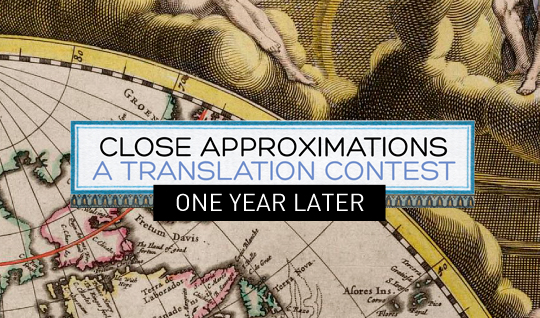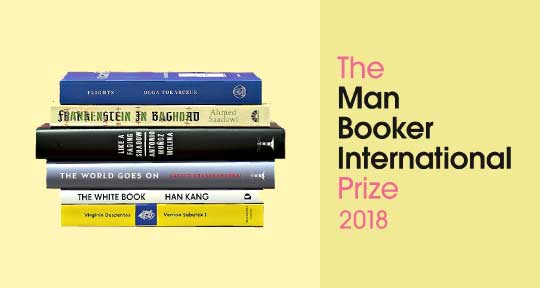“A good reader, a major reader, an active and creative reader is a re-reader,” Vladimir Nabokov reminds us in his article “Good Readers and Good Writers”. There are so many books in this world, and unless your life revolves solely around books, it might be hard to be widely read and an active re-reader. Attaining this level of perfection that Nabokov describes is impossible, but the idea of re-reading as a tool to better understanding the value of a book underpins the philosophy of the Man Booker Prize International’s judging panel since its inception.
Posts filed under 'prize'
Weekly News Roundup, 27 May 2016: Scrabble Champs

This week's literary highlights from across the world
Happy Friday, Asymptote readers! Nearly a year ago, the Asymptote blog published an interview with book artist Katie Holten, who “translated books into trees” with her Broken Dimanche Press book, About Trees. Now that very same book is in its second printing—a feat that is seriously nothing to sniff at in independent, artist-book publishing! And famed translator-slash-friend-of-Asymptote-anniversaries Edith Grossman is featured in the Los Angeles Review of Books‘ “Multilingual Wordsmiths” series, in an interview by Liesl Schillinger. READ MORE…
Weekly News Roundup, 5th June 2015: Don’t Write Your Memoir.

This week's literary highlights from across the world
Happiest of Fridays, Asymptote pals! This is the first week Katrine, new blog co-editor, is on board—so let’s give her a big web-round-of-applause (tapping on the keyboard in the comments section helps). Hi Katrine! You might recognize Katrine because she was a judge for the Best Translated Book Award so, yeah—she’s a celeb.
Speaking of celebs, our former Central Asia Editor-at-Large, Alex Cigale, recently guest-edited a section on Russian poetry over at the Atlanta Review—it’s definitely worth checking out (and look for a blog interview on the guest-editing process soon). If you are a fan of the Norwegian Nobel Prizewinning bard, Tomas Transtömer, here’s a treat—his final interview given before his death, in translation. And, speaking of poetry—the New Yorker has an interesting piece on Jihadi poetry and what it means to share some words.
Multitasking artists: American playwright Tennessee Williams took up painting, once (just like American ex-President Dubya, whose outsider-art paintings I frankly prefer). And Dany Lafferière, a Haitian novelist who came of age in Canada, is the first non-French citizen to be admitted in the prestigious Académie Française.
What are your favorite authors’ favorite words? Here’s a little list. And what’s your favorite curse word—it might not have existed too long ago (except, of course, for “fart,” which has stood the test of time).
How does it feel to write and never be read? Most of us know, all too bitterly. But perennial Nobel-speculation and speculative-fiction writer, Canadian novelist/poet Margaret Atwood, has written for a library that won’t be available for another one hundred years. Will we all be screened-up e-readers by then? The Chicago Tribune thinks not. Nine hundred years later, we’re still collectively obsessed with the old Icelandic god, Loki, though. What gives?
Finally, please, and for the love of God—unless you are Karl Ove (in which case it is already too late): delete your memoir. If it’s written from a female perspective, it’s less likely to win any big prizes, anyway (ugh), unless, of course, it is the Bailey’s Women’s Prize for Fiction (congrats Ali Smith for How to Be Both, this year’s prizewinner). Prizes aren’t always great, though: even judge Marina Warner (from the Man Booker!) is bemoaning the dearth of world literature available in English—good thing journals like Asymptote are working to buck that trend.
Close Approximations Winners: Where Are They Now?

Our very first contest honored emerging translators. Now, a year later, our winners reflect on just what this contest means today
To witness the broad reach of Asymptote, one need look no further than Close Approximations, Asymptote’s first-ever international translation contest targeting fledgling translators and awarding $3,000 in prize money for two categories: poetry and fiction. (That’s $3,000 from your generous donations going directly into the pockets of these literary practitioners, but don’t forget that running a contest also requires heavy promotion—both paid and unpaid—, Asymptote‘s own editorial brainpower—in this case, to screen for the 20 best prose entries—, unseen but substantial administrative work—organizing contest entries and fielding queries from prospective contestants.)
Judged by no less than acclaimed translators Eliot Weinberger (in the poetry category) and Howard Goldblatt (in fiction), this contest received close to 200 submissions. Those who emerged victorious were lauded for their ability to “successfully cross the linguistic boundary,” and render translations that “zip along.” (Here are the complete judges’ citations.) Read on to see where these gifted newcomers find themselves now, a year after winning. If you would like to help us run a second contest (that will include a new nonfiction category!), give us some love—especially now that we’re entering the final stretch of our fundraising campaign, with TEN NERVE-WRACKING DAYS left!
—Lee Yew Leong, Editor-in-Chief
Weekly News Roundup, 12th December 2014: Rare! Exciting! Interviewed!

This week's literary highlights from across the world
The mainstream American media is catching on—but doesn’t seem to grab a snag—on elusive and dramatic Italian novelist and cult phenomenon Elena Ferrante, who offered a rare interview to no lower brow than that of the New York Times this week. Check it out. And speaking of the buzz: take a gander at French Nobel laureate Patrick Mondiano’s Nobel speech—the gist is positive (literature is not, and will never be, in danger). READ MORE…
Weekly News Roundup, 10th October 2014: The Nobel Prize, Pick-and-Choose Grammar

This week's literary highlights from across the world
First things first: here at the Roundup, we’ve been speculating about the Nobel Prize in literature for weeks—at one point or another, we had pitted Japanese surrealist Haruki Murakami and Kenyan author Ngũgĩ wa Thiong’o as the two heaviest hitters—but the 2014 Nobel Prize is an upset (isn’t it always?), going to French writer Patrick Modiano. The committee cited Modiano’s “art of memory with which he has evoked the most ungraspable human destinies and uncovered the life-world of the occupation.”
Not even in the discussion this year was American standby Philip Roth, who seems to have resigned himself to perennial snubbing: “I wonder if I had called ‘Portnoy’s Complaint’ ‘The Orgasm Under Rapacious Capitalism,’ I would thereby have earned the favor of the Swedish Academy.” Hah. This sort of snub comes as no surprise, as a famous Nobel judge claims that Western literature is being laid to waste by the big business of creative writing courses and the general tendency toward “professionalization” in literature.
Weekly News Roundup, 3rd October 2014: Bad Beginnings, But Is this the Year for Murakami?

This week's literary highlights from across the world
Beginning the weekly roundup is often, well, awkward. But I’d like to think my overtures are not quite as cringe-inducing as these ten worst openers in (English-language) literature.
On that note, if you feel like clicking away from this post to go do something more “productive,” don’t abandon your procrastination so quickly—it turns out the oft-reviled quality of procrastination isn’t so bad for you after all. Speaking of putting things off, while I personally didn’t study for the math portion of my GRE, I passed with (relatively) flying colors. Wonder why, but habits of polyglottism may have something to do with it. READ MORE…
Weekly News Roundup, 19th September 2014: Geniuses, References, Lots to Read!

This week's literary highlights from across the world
A big decision about net neutrality approaches for those in the United States, and it’ll do more than make Netflix more expensive. For us at Asymptote, an online publication with a large American readership, this issue really hits close to home—here’s why the net neutrality argument is important for all arts organizations. Luckily, the digital revolution has finally made amends to poetry, as e-books finally become more poet-friendly. Still, reading on a Nook or a Kindle bothers us in other ways: an e-reader gives no page numbers, so how are we supposed to cite it? Please, let’s find a better way to reference.
Weekly News Roundup, 25th July 2014: Bookin’ it, Icy lit

This week's literary highlights from across the world
The Man Booker Prize decision to include all English-language pieces of fiction (not just those in the Commonwealth or Ireland) caused quite a stir last year. Since the longlist has been announced, take a look at what it means to include writers from the United States among the Bookish. That being said, the English novel as we know it is dying, or dead already (for better or for worse: doesn’t this mean new opportunities for translated lit)? And another English-language prize, longlisted: the so-called “International” Dylan Thomas Prize has announced those in the running for the 30,000-pound award. READ MORE…




